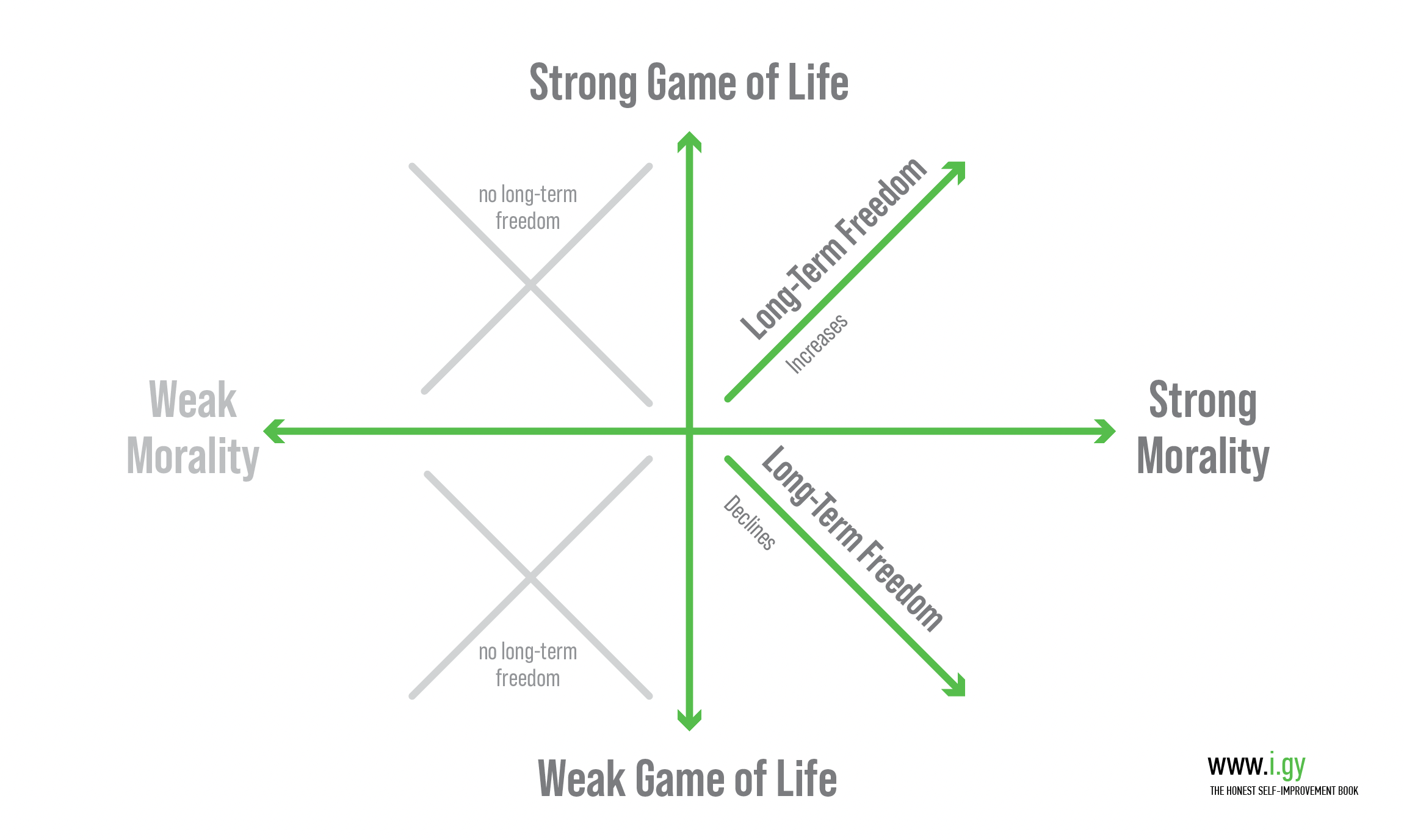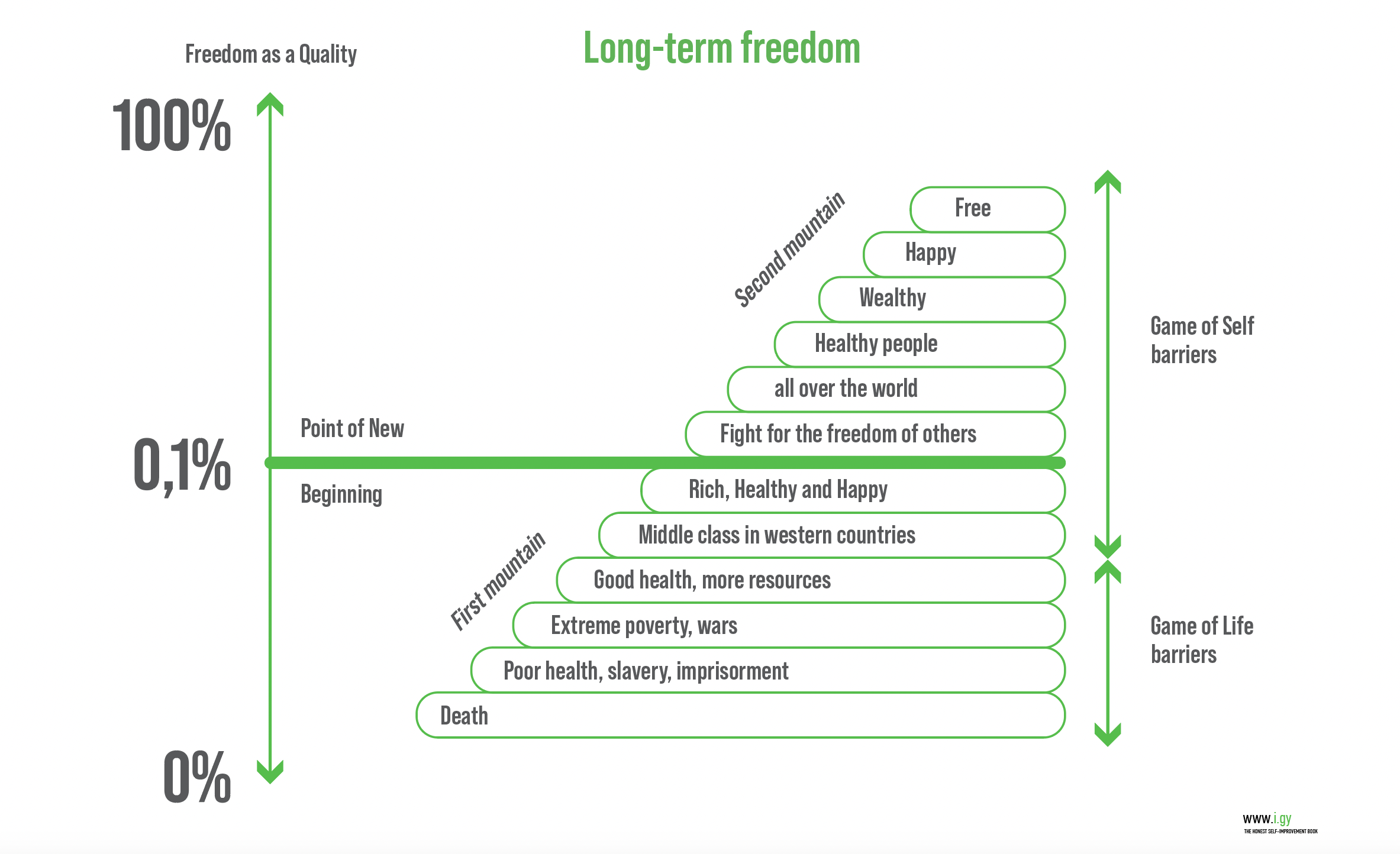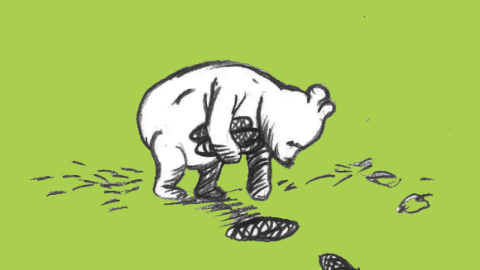Quantity has a quality of its own
Evolution
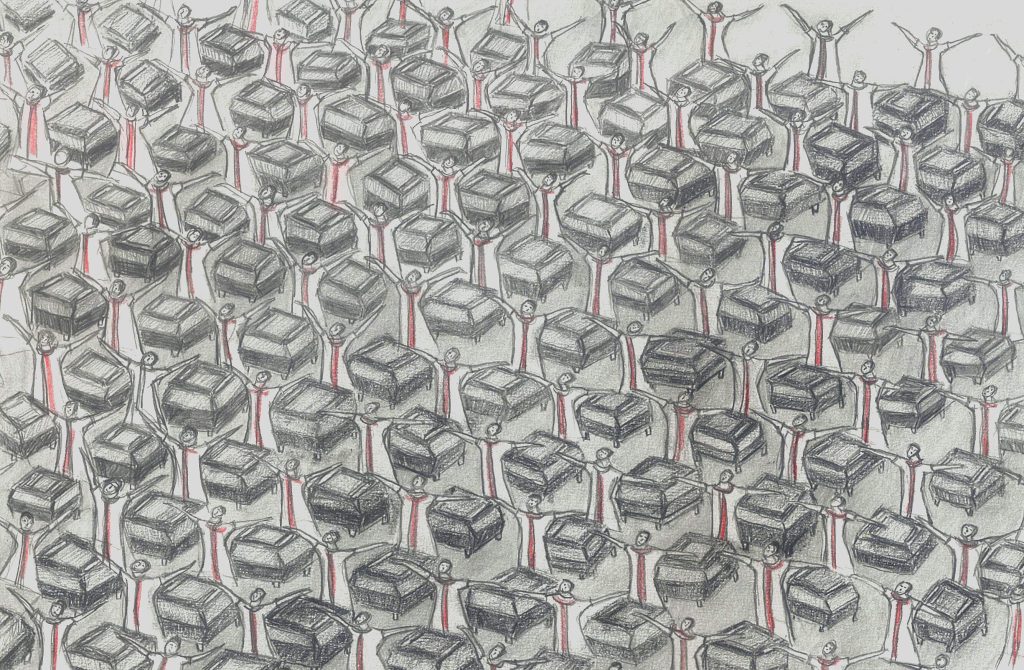
We have been conditioned by our upbringing, education, and culture that quality is more important than quantity.

And indeed it usually is. It’s better to eat a great pizza every week than a bad pizza every day. It’s better to have one good romantic partner than seven bad ones. Everything related to health, joy, relationships, and happiness requires quality. Which, it seems, are the most important things in life, right?
But when you think about it, you can single out two common themes in all such examples.
- There is a visible, tangible limit to the quantity of pizzas and romantic partners you can have. You know the end of the spectrum, and it’s not far away.
- The quality of a single item can be negative. A very bad pizza is worse than no pizza at all.
By extension, we tend to think everything in life works just like that. But there is one glaring counter-example. Freedom.

It does not fulfil the above criteria:
Long-term freedom is always a good thing. There is no counterexample. It has the highest correlation with the other good things in life from any metric you can possibly choose. This is why it’s the main one we measure (rather than compare) in I Grow Younger.
Long-term freedom is a virtually unlimited spectrum; you’re just so unimaginably far away from the maximum freedom you can theoretically have that you cannot even imagine it. It represents the width of the tree of your possible future choices and their consequences for everyone.
Let’s look at the Long-term freedom spectrum starting from the worst level and improving.
It starts at zero with you being hypothetically dead.
Zero long-term freedom, one future choice – to stay dead. Kind of a downer, but at least you’ll no longer be around to experience it. If you’re reading this, you’re alive, which means you’re not starting from scratch. Let’s move up the spectrum from worst to very bad.
With low long term freedom your future choices are crippled by very poor health, being caught in abuse cycles, modern slavery, life imprisonment or other extremely limiting circumstances. You can still do something given time and luck, but it will be a wild effort to positively impact the world from a prison cell in North Korea – you would be lucky even to save yourself. At this level, you have next to zero control over your future.

Next on the freedom ladder, you are mostly healthy and free from abuse, but have extremely limited resources since you live in extreme poverty. Earning enough money just for food and basic necessities is a constant challenge, and success in it largely relies on luck. In such extreme scarcity, many people become vicious in order to survive, meaning you risk domestic violence and petty theft all the time. Although someone stealing your goat is not petty at all if the goat represents half of all your possessions. A staggering 700 million people are caught in extreme poverty, defined by living on less than $2.15 per day. They live in poor, undeveloped countries which also struggle with health crises, government corruption, and often high violent crime rates or large-scale armed conflicts.
As we go higher and higher, you earn more, can take better care of yourself and your family, live in a more developed country, and allocate more of your time to search for happiness instead of fighting for survival.
Until this point, life was mostly forcing you to be in hunter mode at least part of the time, as succumbing to inertia was not an option – you had to be active and creative just to survive. If you visit a poor country, you’d be astonished by the creativity of the local people.1

They have no other choice.
So, your barriers up to here were mostly Game of Life ones (concerning resources).
As life up the spectrum gets more comfortable and resources more abundant, you may feel less challenged, meaning you may encounter more Game of Self problems – motivation may be low and the lack of meaning in your life more pressing, potentially leading to depression, anxiety or addiction. Such Game of Self problems are just as dangerous as Game of Life ones and have a huge impact on happiness. Rich and famous celebrities can be depressed to the point of ending their life.2 People in poor, crime-ridden Central American countries like Honduras and Nicaragua are, on average, happier than people in my home country of Bulgaria, even though most Bulgarians objectively live a much safer life with much fewer problems. A strong Game of Self gives you considerable leverage over your circumstances.
But it’s not just the happiness that may suffer, it’s also your freedom. If you’re not happy because of internal barriers, you’re not truly free.3 A comfortable life, combined with easy dopamine hits from social media and other sources, is a direct path to inertia and sheep mode in your life.
As we get to a middle-class person in Western societies, the amount of long-term freedom has significantly increased. Your wealth and income will allow you to live mostly where you want, change jobs if you don’t like your current one, or start your own business in order to be independent of bosses in your work.4
As you become wealthy, resources are no longer a problem, and you seem to have no more pressing Game of Life challenges to solve. You just need to be grateful and wise, give to charity, and live happily ever after. Is this the endgame of the long-term freedom spectrum?
No, it’s actually just the beginning!
You did what you could for your freedom. But there are billions of people in the world who have way less freedom by no fault of their own, just due to the places they were born in and/or tough luck. While it’s not your fault for being lucky or privileged, personally, I take it as a responsibility to fight for their freedom too. You may or may not agree with me, and you certainly don’t have to, but that’s actually of little significance. It’s scientifically proven that helping others brings joy and meaning to life, and the feeling of development and growth is great for mental health. Since you’re already rich and mental health is the main thing that can ruin your life (remember the depressed celebrities), where to grow except in the ability to help others? It’s a win-win for both growth and meaning.5 So even if you don’t want to do it for others, it’s still the best option for yourself. This “second mountain” you can climb is virtually unlimited. No more ceilings for what you can accomplish. No goals, no limitations, only a fulfilling flow.

We can define complete freedom as the ability to significantly improve the long-term freedom of every human or conscious animal in the world that struggles with it.
It’s the endgame of Effective altruism, a philosophical and social movement I like, if we remove the questionable recent addition of Longtermism from it.6
Not a single person today or in history has ever (or has had) anything remotely close to complete freedom.
Complete freedom means no more preventable death and suffering on Earth for any conscious being.
It means curing all diseases that can theoretically be cured, which are probably all of them. It also means that the cures are to be accessible to everyone who needs them.
Complete freedom means being able to stop any war or violent conflict and to be able to free any innocent or political prisoner anywhere on earth. None of us, including the president of the United States, can free the hundreds of thousands of severely mistreated innocent people in North Korean or Iranian prisons. Our freedom is not high enough to do that. And we can agree that we all want it to happen, so it’s not a morality (quality) problem, it’s exclusively a lack of freedom (quantity) problem.
We can continue with many more examples regarding the 40+ million people trapped in modern slavery, the 700 million people living in extreme poverty with 1-2 dollars a day, and the hundreds of millions who will experience domestic violence in their lifetime.7 But you get the point.
Regarding the animals, the picture is even bleaker due to the incomprehensible scale of modern factory farming. It’s hard to wrap your head around the following number. More than 100 billion animals are killed for meat and other animal products every year, hundreds of millions a day. Their lives can be summarized as suffering so we can have cheap meat. According to Peter Singer, this is the greatest moral crime of our time.
Depressing or motivating statistics? Your call. Remember, none of this is your fault. But why not be your responsibility and your path to meaning… to fix this, at least the suffering-to-reduce-costs part? Isn’t that worth fighting for?
The truth is that if you have a heart (and I believe you do), you cannot really look away from many of these things. While you’re fighting for your own freedom, it’s normal to put them aside for a while; after all, in order to give, you need to have. But once your fight is largely won or simply feels close to won enough, so as not to be a motivating challenge anymore, why not take some more fights for people and animals whose future is completely out of their hands? And if you are not motivated to fight for your own freedom because you don’t think that highly of yourself and you don’t see much meaning in it, here is all the meaning you need – you want to give, and in order to give, you need to have. Not feeling it strong enough? Go volunteer in Sub-Saharan Africa and talk to people in extreme poverty for a few weeks, and you’ll get motivated for life. Just do something, make a first step!
Even if you are a successful person and a millionaire, you have not even achieved 0,1% of the complete freedom that you can theoretically achieve. You’re just beginning to touch lives outside of your peers and community. So don’t stop growing your freedom. They need you to have the power to help them.
So let’s fucking scale!
There are two clear improvement scales in life. The net contribution of every person to society is roughly proportional to the multiple of those.
The morality scale (the “quality” of your actions)
“Gradually it was disclosed to me that the line separating good and evil passes not through states, nor between classes, nor between political parties either — but right through every human heart.”
Aleksandr Solzhenitsyn
This is mostly about how much you value others and about not putting your needs, ego, or beliefs above their needs and their humanity. To oversimplify, the full scope between Stalin and Gandhi. Most people are not mass murderers (or even assholes that would be mass murderers if they had the chance and laws didn’t exist). Most people are not Gandhi either. We generally have the capacity for both and mostly do what other people in their social tribe do. Most of human existence can be summarized in seven words:8

People Like Us Do Things Like This – Seth Godin
The lowest possible average we can assign to humanity on the morality scale is 50%; the average person is at least half moral. This is consistent with the theory that morality was a beneficial evolutionary trait.9 According to my observations, around 30% of people are actually so highly moral that it becomes an obstacle for their personal growth journey and reduces their long-term freedom a lot.
 But the morality scale does not exist in a vacuum. As moral people create and immoral people destroy social value, we have to ask ourselves…
But the morality scale does not exist in a vacuum. As moral people create and immoral people destroy social value, we have to ask ourselves…
What is the net outcome, not just in morality but in consequences?
Historically, the destroyers were winning for a long time. It was easier to start a war than to stop one. It was easier for a barbarian invader asshole to burn your crops and village down than for you to prevent them from doing so. And it was easier for people in power to abuse it than for people with near-zero power to stop them. Those were harsh times.

But things gradually improved. More trade made people and countries cooperative. Civil rights and protections followed, rule of law, eventually democracy. Women and minorities received rights and protections. But I find the main keys to progress to have been science and technology. Those were a big deal since they created a framework which helped ideas become reality, mostly the good ones. Thus, the value of ideas became much greater over time.10 Even if Archimedes could conceptualize a submarine in ancient Greece, there was no way they could actually build it since metallurgy and engines was hopelessly behind the needs of a submarine. So great ideas just languished, waiting for their time.

Now it’s very different. We have a humongous body of tested and verified knowledge in science and equally impressive industrial capabilities. Every idea can potentially change the world, as it can become a reality if it benefits people. True, this also applies to very dangerous stuff like weapons of mass destruction. But still finding the industrial capacity and financial incentive for those will be harder and more expensive than for something we all love and buy, like modern computers. Killing people is not just wrong, it’s also very unpopular and not economically profitable.
I will make the bold argument that the world has recently come to the point where it’s easier to create than to destroy. Despite their drawbacks, our frameworks for preventing destruction (the rule of law, international treaties, the cooperation that enables trade and supply chains, bureaucratic juggernauts like the EU) are quite robust which we can estimate by the significant reduction of major wars in the last decades. Some industries are now actually overregulated, meaning we went too far with preventing potential destruction, and we’re now obstructing creation too much. A typical example is clean energy red tape.

In the digital world, destruction is easily reversed, and the friction of creation is very low. This gives rise to projects of monumental scale and quality, such as Wikipedia and open-source software like Linux.
There is always a danger of sliding back, of which we see worrying signs with the wars in Ukraine and Gaza, as well as the rise of power consolidation of dangerous authoritarian-leaning leaders. Trump, Putin, Xi Jinping in China, Modi in India, Bolsonaro in Brazil, Erdogan in Turkey, Netanyahu in Israel, and Orban in Hungary are nothing to marvel at. But in such a critical moment, we need creativity above all. Ideas are what will save us from hate, division, misinformation, and populism. Ideas open the gates for a refreshed, more compassionate view of the other side.
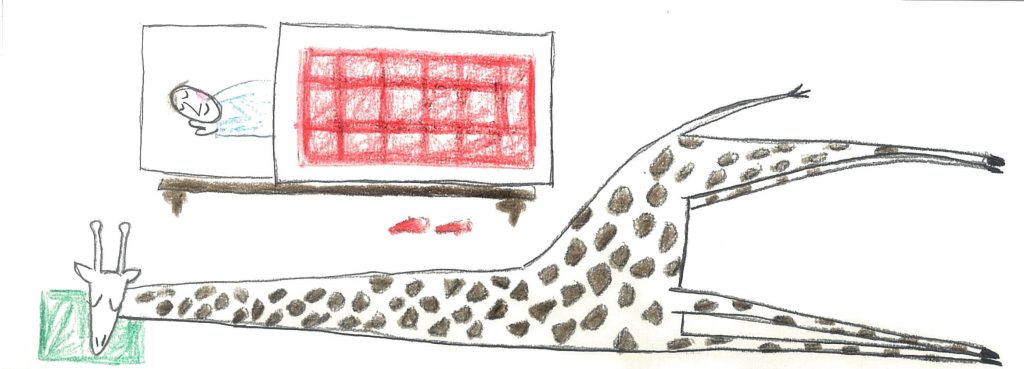
Most people are ultimately well-meaning. The populists’ followers are usually decent people who have been heavily manipulated into believing a story of twisted truths. If we had learned critical thinking in school, this might not have been the case.
Since most people want to contribute ideas for the common good, and we need ideas and have an imperfect-but-mostly-working filtering system for them in science and the free market of money and attention, the contribution of most people is a net positive for society at large.11
When we take into account that most people focus their love and attention on their loved ones behind closed doors, it becomes even more positive.
When we add that the most moral people are also largely afraid to scale their contribution and have tremendous potential if they do, we come to the conclusion that humans are, on average, morally positive, and we need to give every person more freedom to do just that. Which is what I Grow Younger is created to do.

As we said, our contribution to society is roughly morality multiplied by scale (which we measure in the freedom to help ourselves and others).
The freedom scale (the “quantity” of your actions)
Hm… we are mostly moral, but even a millionaire is not even at 0,1% of their potential for freedom. Even Bill Gates (leaving aside the question of his morality) is probably at 2-3% freedom, as his foundation has the scale to meaningfully help no more than 2-3% of the world’s population. Not to speak of the poor animals in factory farming.
The President of the United States (given Congress and the courts fully support them) and Xi Jinping are probably maxed at about 8-10% freedom each.
So, let us get this straight.
One of our multipliers (morality, a quality) is at 60-70% of its potential in the average person. Even considering the lower half of the scale is negative (causes harm), so our actual scale is from -100% to +100%, we’re still at 20-40% on the positive side. Progress can surely be made, but…
The other one (freedom, a quantity) is at maximum 0,00001% for the average person, 0,01% for millionaires, 2-3% for Bill Gates, and 5-10% for our top two world leaders, given their whole countries support them unequivocally.
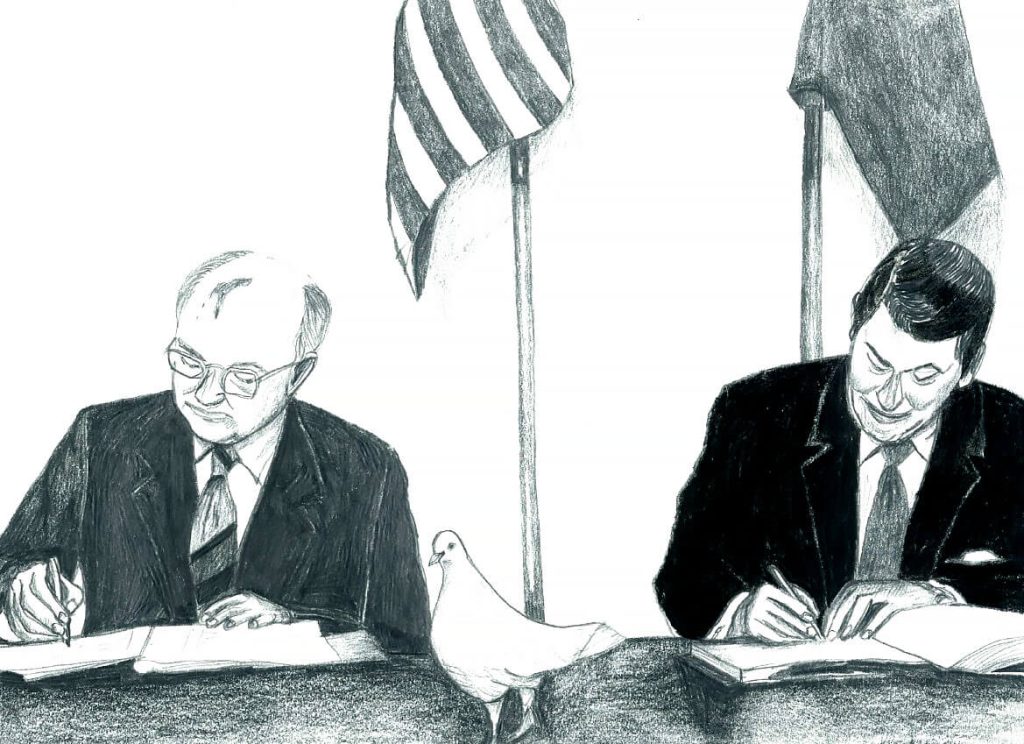
Hm…. I wonder where we should seek the most progress!? The average person has more relative morality than Xi Jinping has relative freedom. I’ll repeat this. You’re probably more moral than Xi Jinping or the President of the United States is powerful enough to do what they want. Relative to the theoretical maximums.
And another question about the same equation. Do you think it’s easier to make a politician more moral or to make yourself more powerful and free? Which is in your own hands and which is not?
I hope you are by now convinced that both you and the world need you to scale the long-term freedom scale as far as you can go.
And past a certain point, you will be focused on helping others… which in turn will give you joy and meaning, something that wealth itself cannot do long term.
After we solved the why, let’s discuss the how.
How do we scale our freedom?
In the Freedom post itself, we talked about small life choices (all our millions of microdecisions). We also painted a grand picture of entrepreneurship as a misunderstood (most businesses fail) but actually relatively reliable path to higher freedom, when done right. So, we covered the big and the small, but we didn’t cover the middle. How do we actually pull it off? Here, we’ll talk about practical scaling.
Once you have covered the basics of physical and mental health, you need a scaling path.
Life is complex and offers many paths to success and wealth. Some require a lot of talent; not everyone can become an opera singer. Some have very low odds of success, like becoming a professional athlete in non-mainstream sports – the ones whose existence we only remember during the Olympics. Some are mentally very challenging, like cutting-edge science. Some are greatly dependent on capital, like trading and investing. Where is the sweet spot for the average person? And it better be a big spot, because you need flexibility in order to tweak the path according to your character.12
The sweet spot, if you don’t have any special talents, is entrepreneurship.

Building some kind of business is the most common way to wealth and freedom. This way you make money, which can be converted into many freedom-improving activities for you and others:
- Hiring people whom to delegate to and free time.

- Trading money for time in other situations, eg, taxi usage.

- Reinvesting to make more money.

- Supporting good causes that need funding.

- Hiring people who can bring positive change to the world.
Remember this: It starts and ends with hiring. Nothing is as valuable as the efforts of smart, motivated people.13 For everyday chores, you can outsource. But for your core activities in life, you hire.
To summarize:
- Billions of people and many more animals would really, really appreciate your help. This path will also give you unlimited access to growth and meaning. It’s a flow; there is no limit.
- To help them, you need morality and freedom; you’re already mostly moral, but you’re like 0,000001% free.
- Freedom comes with covering basic requirements in the Game of Self and then scaling in the Game of Life. It’s a quantity, not a quality!
- Once you overcome your Game of Self challenges, the scaling of freedom has a high correlation with money and understanding how the world’s structures work.
- The best path to both of those is starting and scaling a business in a profitable industry where you focus on making money selling to rich people and other businesses, rather than making something for the crowd.
- At the very start, you will likely fail. But make sure your fails are fast and small, rather than big and slow. They will be educational, and you’ll learn how the world works in practice. In this initial period, you need a lot of hunter mode and a healthy amount of chaos. The right industry choice will make sure you eventually succeed.
This is important generic advice.
Specific advice for scaling a business, freedom, or wealth is dime a dozen, so you should be wary of questionable gurus, seminars, and courses. There is often a conflict of interest when they mix advice about your life with promoting their paid shit.
However, I Grow Younger doesn’t try to sell you anything and is completely unmonetized. Thus, we’ll give two specific pieces of advice that you won’t find at almost any other source because they cannot be monetized and run contrary to established myths. Let’s go into uncharted business scaling territory!
Scale comes with individual scaling steps. You don’t scale while eating breakfast; you actually have to do something in this direction.
Once you have a business going well and have already tasted economies of scale, it’s easy to see the next steps. You need more sales, so you hire more salespeople. You need cheap, yet good support – you outsource it to the Philippines. All textbook stuff.
But before you actually have anything, where do you start? How do you scale before the economies of scale kick in?
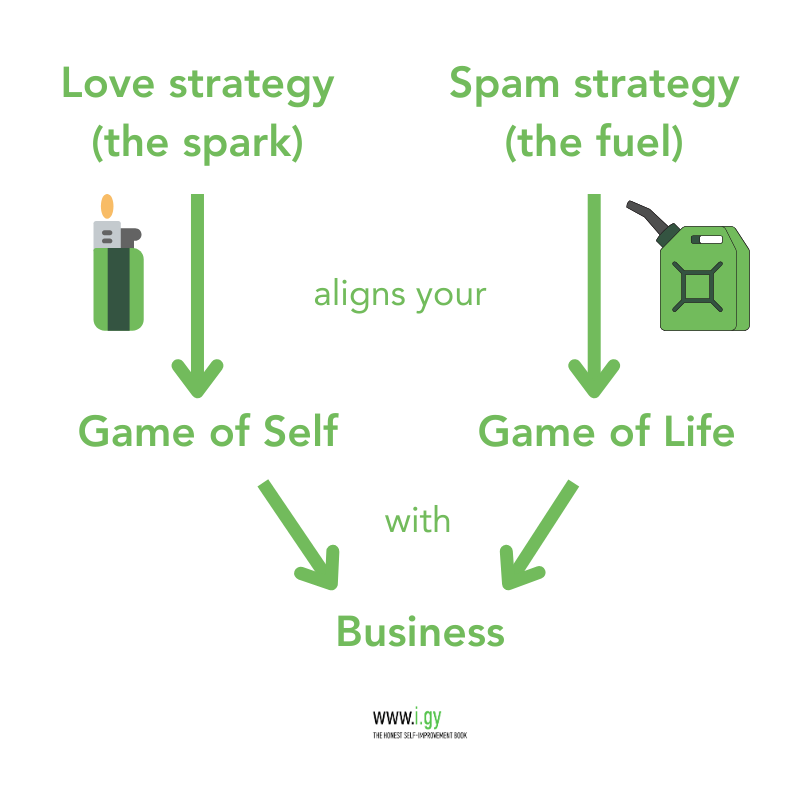 Here are two crazy-enough-to-be-great strategies that each cover the respective Game of Self and Game of Life sides of scaling from zero to one. They combine perfectly, too.
Here are two crazy-enough-to-be-great strategies that each cover the respective Game of Self and Game of Life sides of scaling from zero to one. They combine perfectly, too.
A. The Love Strategy in Business (Game of Self)
Let’s see where founding a business can go wrong:
- Wrong team (typically when you hire for skills, not character)14
- Wrong company structure in terms of equity and responsibility distribution15
- Bad combination of industry, niche in the industry, and business model
- Bad company culture that doesn’t value freedom, fairness, growth, and fun16
- And most common of them all… never actually launching
How do we fight all of these dangers at once? Crazy flow-based solution incoming
The very first step (hopefully you can afford) is hiring for your very first employee a person you genuinely care for – a really good friend of yours, even if they have just some of the skills you deem needed. It has to be someone you have high emotional trust in, someone you can completely be yourself around. You can do this before (!) you start any execution on your actual business idea, even if you have no idea from where to start. In fact, especially if you have no idea where to start.
Even better, you can hire your girlfriend/boyfriend. The closer the person, the better, with the possible exception of family.
You just mixed work and love. The world didn’t explode. In reality, three things happen in parallel:
1) You introduce love and empathy to your future company from day one.
2) You create a potential future challenge in your relationship or friendship. True relationships or friendships survive those and only emerge stronger after them. Bad ones fall apart… but you don’t want bad ones in your life. Free of charge, a precious trial by fire, a win-win.
3) You create the best Game of Self framework for the future, down to the details.
Here is why your launch will only benefit:
1) Double the Motivation – This step is one you can reverse by firing them… but you probably really, really wouldn’t want to. So, it’s the perfect combination of giving yourself strong positive motivation (helping a friend) plus strong negative motivation (not letting a friend down). At the same time, if you actually have to fire them, it’s not such a big let-down; life goes on. So your negative motivation comes at a reduced cost – as usual, the negative consequences are bigger in your head than in reality. Failure seems not to be an option, while in reality it’s a non-fatal option – a perfect motivational setting.
2) Long-term urgency – A main problem when starting a business is most people are just too fucking slow. They are either afraid of failure or their world (e.g., an exhausting day job) is taking so much of their time, focus, and energy that there is nothing left for the business. But time, focus, and energy are a matter of priorities, nothing else. Having your girlfriend waiting for their next salary will make sure you prioritize the new project rather than losing to inertia.
3) Short-term urgency – They will need tasks on day one. So you’ll have to start doing something right now.
4) Industry, business model, and future company culture – When you’re starting a business, you’re hyped, and tough tasks don’t seem that tough. Cold-calling 1000 potential clients? No problem, I’ll do it in a week. However… if you have to cold-call 1000 potential clients to start your business, it’s a signal not just that it’s tough now, like every start… It’s a signal it will be tough forever. I founded an 8-figure company without me or anyone from the team making a single cold call, ever. Because the industry choice was great. Could we be more successful if we were cold-calling people? Possibly, but I don’t give a shit. Money is not everything. It’s important to have fun and remember basic ethics, like The Golden Rule. Would you enjoy receiving 1000 cold calls? Exactly. If you have the feeling you’re being unethical (even if it’s how your industry works and all of your competitors do the exact same thing), you’ll sabotage yourself mentally until you fail. Industry choice can bake in your failure from the start. Avoid cut-throat industries where the competition is unethical like the plague.
What does this have to do with your friend? We tend to be more empathetic to our friends than to ourselves.17 If your friend has to do the 1000 cold calls, you’ll probably feel bad. If you do them instead, they will feel bad for you. This is why it’s very important to be close – otherwise, you’ll probably won’t express those feelings strongly enough. This empathy and work-related compassion are precious because they signal to you that for the whole future of your potential company, people will matter more than money and raw performance numbers. This is how the companies, where people love to work and stay loyal to, are built. This is how elite Navy Seal teams are built. This is how great sports teams are built. Every time humanity and compassion triumph over distance and indifference, you will see a massive increase in happiness and performance.18
Your industry and business model have a lot to do with having a great company culture19. Industries are far from being equal on the spectrum between easy and cut-throat, and the diversity of business models just adds to the imbalance. If you truly want a good time at work for your friend (and thus your future employees), you will be motivated to steer towards a better industry and business model. Companies change these all the time; it’s not like they are fixed. Nokia started out as a paper mill, founded by a mining engineer in 1865. It’s not the industry and business model that define a company; it’s the people and culture. Your friend will help set those values straight.
I’m not pulling this winning idea out of my ass. I have done the exact same thing three times with spectacular results when I started all the really important things in my life, including recently with I Grow Younger. There were also partial and complete failures due to the friend being well-meaning but not motivated enough… but zero truly good friendships were impacted in any negative way, and the projects still took off if they were any good in the first place.
I’m sure you have questions. How about alternatives? Why hire your friend instead of inviting them as a cofounder?
We have already explained in the business post that business partnerships are overrated and have too many paths to failure. But there is something more. Responsibility is best carried by a single person who makes all final decisions. Shared responsibility is a recipe for disaster.20 In almost all business partnerships, there is a junior and a senior partner, even if the equity is split 50/50 and the roles are unwritten – yet they are emotionally understood by both sides. The senior one is defined by taking more responsibility and having the final calls in cases of disagreement. The junior one offers work and moral support, so the senior one doesn’t feel alone in this – a big thing for keeping motivation steady in low moments. But a good employee also offers work and moral support, so the difference between the first employee and a junior partner is mostly just about equity and commitment. But in reality, commitment to you and the business is much more a psychological relationship than something that stems from the actual company structure and equity distribution. The world is full of both business partners who abandoned ship early and early employees loyal for decades, while having zero to a tiny share in the business. Most people’s main drivers are not money and net worth but rather appreciation, freedom, growth, and fun.21 It’s easier and wiser to give your first employee those than half the company. Because you should give them anyway, and because you can always give equity, but once you give it, you cannot take it back. And if you give half the company away, it’s marriage for life with no divorce option.
There are no real alternatives. You can either pull it off by yourself or you don’t. However you feel about it, it’s true. Success is largely a self-fulfilling prophecy. You just have to believe.
What if you don’t truly believe, what if you’re afraid of failure like most people? What if you already failed? Acknowledge the fear, but don’t give in to it; be a hunter. In this case, The Love Strategy allows you to… Change the narrative!
In the new one, you are not starting a business. You’re helping a friend or your favorite girl/guy to have a decent job long-term. Now isn’t that worth fighting for?
Me trying to help a dear friend escape a shitty call-center job resulted in me prioritizing the founding of a content website business in 2008. I had considered this idea for 3 months, but had never done much about it. But in order to be able to offer this girl a job, I finally launched it. She accepted the job but didn’t stick around for long as her studying got more intensive. The business, however, endured. 16 years later, it’s worth about $70 million.
And this is how The Love Strategy works for you.
It makes you start with the right foundation, which is a huge part of any future success.
Love will help you scale a business.
B. The Spam strategy in Business (Game of Life)
If you can’t beat them, outspam them…
…said no bullshitter in an advertising agency ever
(Spam is the SEO industry’s slang term for going for quantity in areas like content and links, while most of the competition strives for quality. It’s not related to the annoying email spam we all hate. The word is often used in a positive sense as an antipode to the bullshit/fake quality that plagues the industry. I have come to realize other industries have the same internal political battle between their versions of Spam and Bullshit, with Spam revealing the ugly truths of Bullshit in an ugly manner).
We can all agree that prioritizing is important in life because this is how key shit gets done. “22 The main thing is to keep the main thing the main thing,” is a valid point.
But there is also another approach to getting it done – do everything. Then important shit will always get done too.
So two possible approaches to life emerge:
- The thinker approach – think about what’s best, then do it
- The doer approach – do it, then see if it was the best, adjust
When comparing the two approaches, people usually have a massive and totally unfounded bias to the thinking approach. In reality, we so rarely know for real what we are doing that the doer approach is more effective.23 But why? Because of speed. Doing it is usually way faster than thinking about it, and then doing it.
The faster you do things, the more shit gets done.
Captain Obvious
The doer approach also delivers the healthy chaos that we already said is essential for an early-stage business because you need to maximize diverse experience, and build intuition and meta skills.
And finally, the doer approach has a key two-way relationship with the hunter mode:
- The more you are in hunter mode, the more you do.
- The more you do, the more you enter and stay in hunter mode.
So, a total win-win-win, let’s just do everything and move at the highest speed possible? Unfortunately…
When you have not yet started a business, you’re moving at zero speed.
Captain Obvious
People don’t have a problem doing everything (and fast!) once things get going.
Because of inertia and fears, they have a problem to start. And most never start. The large majority of potential businesses die in the womb, never to be born.24
So, how do we help ourselves start? How do we solve the situation that we want to do, but it just… doesn’t happen?
I’ll share a crazy-sounding but actually very effective strategy to get yourself moving. It’s perfect to be combined with The Love Strategy from above for extra accountability.
We need four components to reliably demolish inertia and a perfect click between them. It takes that much to defeat inertia.
- We need a base level of self-love, just like we need it for anything else. You don’t need too much here; just don’t be at rock bottom or the concept won’t work, also you have bigger problems then.
- We need a self-spam strategy that will transition to an outgoing spam strategy.
- We need FOMO.
- We need… to turn our brains off. Thinking will not only not help in this one, but in fact it will completely ruin the strategy!25
I’m sure you’re by now on the edge of your seat to learn how we turn a bit of self-love + self-spam (WTF is even that!?) + FOMO (a bad thing in general, like all fears) + turning your brain off into… the start of a massive success.
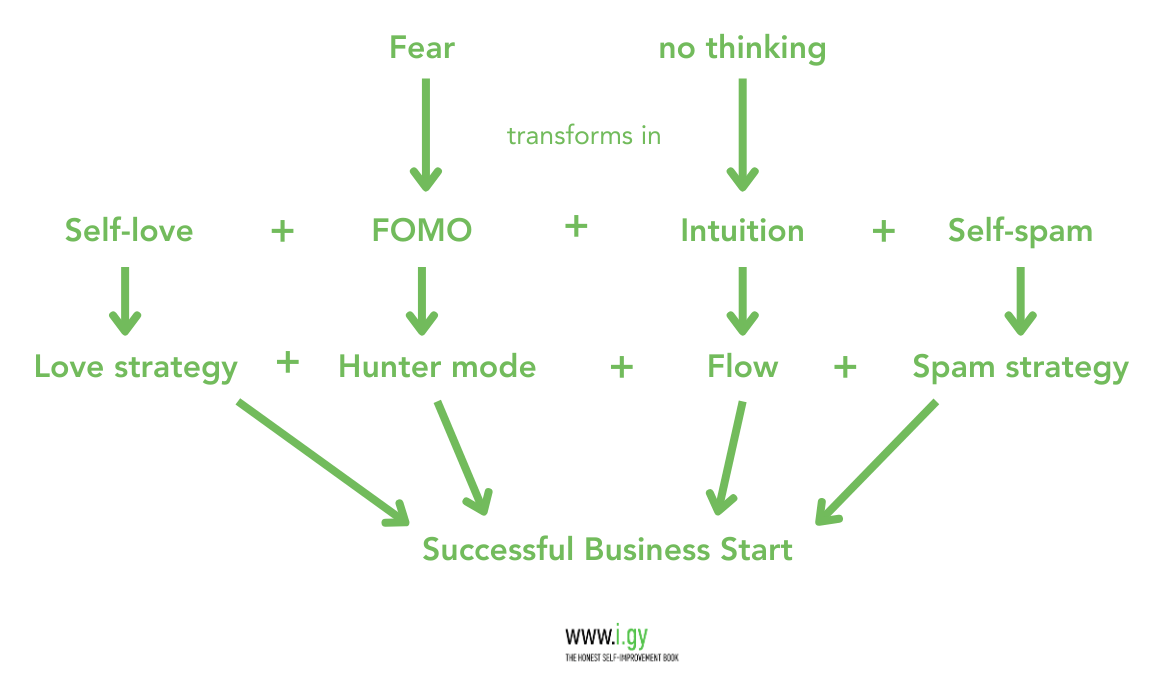 But first, let’s see the common scenario:
But first, let’s see the common scenario:
You start doing research on your future business26. You open a ton of browser tabs. You compare data. Then you obviously need a plan. You take information from the browser tabs and systematize it into some notes. Then you spend a long time looking at those notes and thinking about what your next steps should be.
Months go by, and nothing happens. Why? Because you are now in thinking mode, not in doing mode. And because you spend a lot of time thinking, the cost of failure now seems higher, leading to more fears. Those get you in sheep mode, and you just do nothing. Inertia wins. You lose.
Now, don’t get me wrong, there are freak bot people who achieve success in this way, fighting against human nature with their brute force. But I’d much rather push my boulder downhill than uphill.
Believe me, this scenario has happened to me more times than I can count. I have endless notes full of ideas, big and small, that I haven’t even returned to in years. And most people are in the same boat when starting their first business.
What went wrong? We had nothing to counter our inertia, no force to push us forward. A plan is not a force!
It’s hard to manufacture motivation; it comes and goes quite randomly. But you can trick yourself into some tiny action that will bring some tiny motivation, then more action and more motivation until you get everything rolling.27 How? By using our weird combo.
The start is the same, we open all the browser tabs and collect some data, and try to build some basic intuition. But the similarities end here. Because now you turn your brain off. No. more. thinking. Or planning.
The best way to start is not to think. Because thinking generates excuses and excuses are so hopelessly worthless and paralyzing that I will simply tell you to:28
Fuck your excuses! They have no place in your head.
Ok, you have no (logical) brain for a while; you are now a bot. What happens?
- In the background, your intuitive brain still works on the initial data, but it will take some time until proper intuition of the field is developed. Grant your brain this time. Don’t dilute the data with thinking. Just take a humble intellectual “pass” until the structures settle down.29
- You are prohibited from using any notes, apps, plans, mind maps, or anything like that since those provoke thinking. You don’t know what you’re doing at such an early stage, so planning is a waste of time, and your plan will suck. You need to start doing something instead! The good news is that after hours of exhausting browsing, you will probably not have a strong desire for boring note-taking; you will rather make it out of FOMO. But you can use the same fear to your advantage!
- Since you have no notes whatsoever, closing the tons of browser tabs feels uneasy (FOMO!). You invested a significant amount of time finding all those websites on the topic; what if there is something very key to success, and you never find it again? You could bookmark them, but you have a strong and justified suspicion that you may never open these bookmarks again. So, you temporarily use inertia on your side and do the easiest thing. You do nothing at all. Just leave the tabs open for now, not knowing what to do and not having a plan. Congratulations! You just self-spammed yourself.
- Life with 50+ open browser tabs is objectively not fun. They are tiny, get in the way of everything else you do, and slow down your PC. But you scored a silent win – you didn’t start thinking! There are no plans and no excuses for why they will fail. So, there is still a chance of doing something!
- Over the next hours/days, you realize this shit cannot continue because even a small amount of self-love is incompatible with living with 50+ open browser tabs. You either need to do something or close them. But now the FOMO is even bigger, if you close them, this browser BDSM was all for nothing! Your options rapidly diminish, leaving only the best one available…
- In the end you either get inspired or pissed off but the outcome is the same. You let go and transition to spamming the world. Once you get going, there is no stopping!
- Every browser tab becomes some action(s) if possible; the rest you just close. You send emails and messages via contact forms. You add people on social media. You join Facebook groups and subreddits. You share your idea far and wide, asking for feedback. You may choose a brand, search for and register a domain name, as well as social media usernames. Just commit to many small steps that require little money or long-term engagement, but will get everything rolling. When you write to tons of people, they answer at different times, giving your motivation levels many small boosts over a long period.
What are the benefits of this extremely messy… err, I guess… structure?
- First and foremost, it gets shit done. You started.
- It opens you up to the flows of the world. Treating your ideas like precious children is stupid. Let them out in the open; you need feedback.30 No one will steal your idea, this is very rare – people lack motivation to get their own ideas going, let alone foreign ones, to which the brain is always colder.
- The FOMO has a special place in this process. If this is your first business, you will probably be afraid of failure – it’s normal because you haven’t failed so far and don’t know what it’s like. Just like with many other fears, this holds you back. Fear is a universal monster with many tentacles, and once you unfortunately already have it, you can steal some of it to use as FOMO in a structure where the FOMO helps you narrow your choices to the only good one. Once you act on some browser tabs and close some others (because there is no appropriate action), you have faced your FOMO, which, like facing any fear, has benefits across the entire Game of Self, leaving you more in hunter mode than before.31
- Finally, your “spam burst” makes you more likely to spam in the future, increasing your chances of success. Spam is simply a direct, non-bullshit path to information, attention, and money, and can take forms while also being a skill. You are not evil or even selfish when spamming in the right way!32 If you’re brief and direct, people will appreciate you valuing their time. If you’re cute and funny, they will value you trying to brighten up their day. Many will gladly point you to better directions. So go! Ask questions. Ask for introductions with more people. Ask for prepayments to test if the pain your product/service will solve is real. Do all the things!!!
- You didn’t need your logical brain; in fact, you had to turn it off. Your IQ was mostly irrelevant. Which makes this path valid for most people, not just smart ones.33
This is a structure that works for me. Of course, it’s an example; there are alternatives to the BDSM browser experience. Find out your own way of shutting down thinking, planning, and excuses, so you can start doing. But as your box-based left brain hemisphere will fight back and thoughts and excuses will creep back, you also need to generally focus on developing your intuitive, flow-based right brain. Intuition comes from diverse experience, and starting and running a business is one, so we come full circle – You launch requires intuition, but it also creates it on the fly. We just need the ignition to start!
The spark of this start is The Love strategy, which aligns your Game of Self with the business.
The fuel for this start is The Spam strategy, which aligns your Game of Life with the business.
There should be no barriers. You are a part of your business, and it’s a part of you. In the right industry, just like in any beautiful relationship, it just gets better over time.
Your journey to money and high freedom has begun. By starting optimally, you’re halfway there.
Let’s scale your freedom for the many that can’t fight for theirs.
-
- Robert, N. The Survival Strategies of Poor Youth in the Metropolitan City of Douala, Cameroon.//Terrorism and Developing Countries, 2020.
https://www.researchgate.net/publication/340713723 - Keyes, K. et al. The global impact of celebrity suicides: implications for prevention.// World psychiatry: official journal of the World Psychiatric Association (WPA), Jan 2021.
https://pmc.ncbi.nlm.nih.gov/articles/PMC7801848/ - Burns, R., Crisp, D. Prioritizing Happiness has Important Implications for Mental Health, but Perhaps Only if you Already are Happy.//Applied Research in Quality of Life, Jan 2021.
https://www.researchgate.net/publication/357747629 - Cjauvel, L. et al. Rewealthization in twenty-first century Western countries: the defining trend of the socioeconomic squeeze of the middle class.//The Journal of Chinese Sociology, 2021.
https://journalofchinesesociology.springeropen.com/articles - Titova, M., Sheldon, K. Happiness comes from trying to make others feel good, rather than oneself.//The Journal of Positive Psychology, Mar 2021.
https://www.researchgate.net/publication/349922479 - Lundgren, B., Kudlek, K. What We Owe (to) the Present: Normative and Practical Challenges for Strong Longtermism.// Futures, Dec 2024.
https://www.researchgate.net/publication/383995036 - Kamaldeen, R., Dawodu, M., Ogo-Oluwa, A. Poverty and Frustration as Predictor of Domestic Violence among Sandwich Students.// Jurnal Penelitian dan Pengembangan Sains dan Humaniora, 2023.
https://www.researchgate.net/publication/378081246 - Rao, P., Jain, K., Mangling, A. A COMPARATIVE ANALYSIS OF MINDSET AND PSYCHOLOGICAL CAPITAL FOR TRIBAL AND NON-TRIBAL ADOLESCENTS.//Journal of oriental research, Dec 2020.
https://www.researchgate.net/publication/360126455 - Burkart, J., Brugger, R., Schaik, C. Evolutionary Origins of Morality: Insights From Non-human Primates.//Frontiers in Sociology, Jul 2018.
https://www.researchgate.net/publication/326270017 - Runehov, A., Oviedo, L. History of ideas.// Encyclopedia of Sciences and Religions, Springer Reference, 2013.
https://link.springer.com/referenceworkentry/10.1007/ - Folina, J. Big Ideas: The Power of a Unifying Concept.//Journal for General Philosophy of Science – Zeitschrift für Allgemeine Wissenschaftstheorie, Feb 2023.
https://www.researchgate.net/publication/368540663 - Kelkar, G., Pundir, A., Ganapathy L. Need for Flexibility as a critical success factor in Startup Projects.// Conference: 15th Global Conference on Flexible Systems Management, 2015.
https://www.researchgate.net/publication/325343281 - Maura, S., Carter, S. Does Entrepreneurship Make You Wealthy?Insights from the UK Wealth and Assets Survey, ERC Research Paper, Mar 2015.
https://www.enterpriseresearch.ac.uk/wp-content/uploads/ - Rick, G., Bill, D. The role of employee motivation.// IJRDO – Journal of Social Science and Humanities Research, Nov 2022.
https://www.researchgate.net/publication/365217564 - Poddar, S., Kumar, V. The role of the employee character in recruitment.//waffen-und kostumkunde journal, Aug 2020.
https://www.researchgate.net/publication/349736923 - Tuek, I. PROBLEMS OF DISTRIBUTION OF RESPONSIBILITY AND AUTHORITY IN THE SYSTEM OF INTERNAL CONTROL OF ENTERPRISES.// EKONOMIKA I UPRAVLENIE PROBLEMY RESHENIYA, Jan 2021.
https://www.researchgate.net/publication/367814157 - Freedom, fairness, growth and fun
Freedom Etchevers, I. et al. Freedom-form organisations, innovation and quality of work life: towards a new model of interaction.// International Journal of Technology Management, 2019. https://www.researchgate.net/publication/332979166
Fairness – Hidayet, T., Sabiyanto, D., Septyarini, E. Influence Of Organizational Fairness, Organizational Culture and Job Satisfaction On Organizational Commitment.// Journal of Business Management Review, 2024. https://www.researchgate.net/publication/382451707
Growth – Allevato, E. Organizational Culture Change: Growth Mindset, Positive Psychology, and Empowerment.// Social Entrepreneurship and Corporate Social Responsibility, 2020.
https://www.researchgate.net/publication/342705336
Fun – Owler, K., Morrison, R., Plester, B. Does fun work? The complexity of promoting fun at work.// Journal of Management & Organization, 2010.
https://www.researchgate.net/publication/240318285 - Your industry and business model have a lot to do with having a great company culture.
Chaudhry, A. et al. What matters more? The impact of industry and organizational factors on organizational culture.// Management Decision, Jan 2016.
https://www.researchgate.net/publication/301237566 - Holas, P., Roczon, P. “Love Your Neighbor as Yourself”: Prevalence and Roles of Self-Compassion and Other-Compassion in Relation to Depression with Empathy as a Mediator in a National Sample of Poles.// Research Square, Aug 2024.
https://www.researchgate.net/publication/382993979 - Ko, S., Choi, Y. Compassion and Job Performance: Dual-Paths through Positive Work-Related Identity, Collective Self Esteem, and Positive Psychological Capital.// Sustainability, Nov 2019.
https://www.researchgate.net/publication/337609815 - Chen, W, Zhang, J. Does shared leadership always work? A state-of-the-art review and future prospects.// Journal of Work-Applied Management, Dec 2022.
https://www.researchgate.net/publication/366670646 - Abdulkhamidova, F. Herzberg’s Two-Factor Theory.// Organizational Communication, Jun 2021.
https://www.researchgate.net/publication/352465259 - Schmid, P, Mast M., Mast, F. Prioritizing – The task strategy of the powerful?.//The Quarterly Journal of Experimental Psychology, Mar 2015.
https://www.researchgate.net/publication/271222551 - Wu, Y., Yuan, C., Chen, M. Editorial: From Thinker to Doer: Creativity, Innovation, Entrepreneurship, Maker, and Venture Capital.// Frontiers in Psychology, Mar 2021.
https://www.researchgate.net/publication/349885301 - Tng, X., Zhu, R., Lv, L. The Causes and Consequences of Entrepreneurial Failure Fear: Research Framework and Future Prospects.// Applied Science and Innovative Research, Feb 2024.
https://www.researchgate.net/publication/378048202 - Wilson, T., School, J. Thinking Too Much: Introspection Can Reduce the Quality of Preferences and Decisions./Journal of Personality and Social Psychology, Mar 1991.
https://www.researchgate.net/publication/21138679 - Gutterman, A. Business Planning for Small Businesses and Startups.//Business Planning, 2023.
https://www.researchgate.net/publication/371563076 - Balleine, B. The Motivation of Action and the Origins of Reward.// Goal-Directed Decision Making, 2018.
https://www.researchgate.net/publication/327351521 - Schlenker, B., Pontari, B., Christopher, A. Excuses and Character: Personal and Social Implications of Excuses.//Personality and Social Psychology Review, 2001.
https://www.researchgate.net/publication/240284151 - Princes, E., Kosasih, W. DATA-DRIVEN ANALYTICS IN THE DECISION-MAKING PROCESS: DO WE STILL NEED INTUITION?.// Journal of Southwest Jiaotong University, Aug 2021.
https://www.researchgate.net/publication/355084464 - Borchet, P., Rochford, L. Feedback valence during business idea development: predictor of performance, motivator of change, or both?.//Journal of Small Business and Entrepreneurship, Sep 2017. https://www.researchgate.net/publication/317485837
- Deniz, M. Fear of missing out (FoMO) mediate relations between social self-efficacy and life satisfaction.// Psicologia Reflexão e Crítica, 2021.
https://www.researchgate.net/publication/354075401 - Fisher, J., Mathieu, R. Ethical dimensions of spam.//International Journal of Internet and Enterprise Management, 2009.
https://www.researchgate.net/publication/220300388 - Suhaimi, S. et al. IQ and Governance Contribute to Entrepreneurship, but in Different Ways.//The Journal of Social, Political, and Economic Studies, 2020.
https://www.researchgate.net/publication/344693245
- Robert, N. The Survival Strategies of Poor Youth in the Metropolitan City of Douala, Cameroon.//Terrorism and Developing Countries, 2020.
Scaling as a Way to Freedom
Be free is the meaningful goal
and world-saver – the single role!
Be pure adaptability,
take whole responsability!
Delegate fully all the rest,
try each and every, do your best!
Hire your friends and spread the joy,
think less, just do and don’t be coy!
Fail always only fast and small,
but don’t forget to scale it all!



